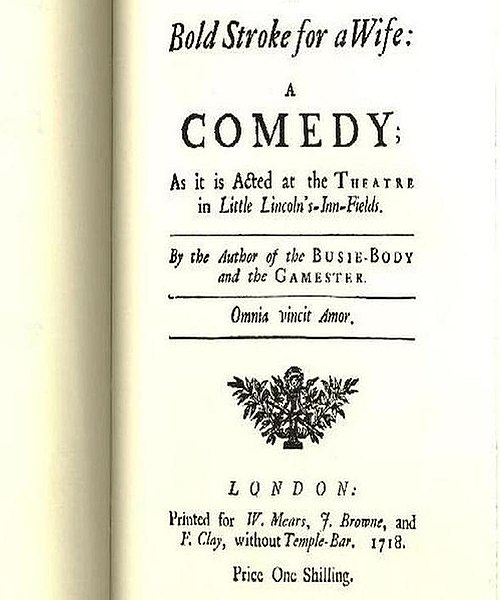Susanna Centlivre, born Susanna Freeman, and also known professionally as Susanna Carroll, was an English poet, actress, and "the most successful female playwright of the eighteenth century". Centlivre's "pieces continued to be acted after the theatre managers had forgotten most of her contemporaries." During a long career at the Theatre Royal, Drury Lane, she became known as the second woman of the English stage, after Aphra Behn.
A mezzotint of Susanna Centlivre by Peter Pelham (1720) originally painted by D. Fermin
Centlivre's The Busie Body
Title page of Centlivre's A Bold Stroke for a Wife, 1718
Poster for 1807 production of Centlivre's The Wonder: A Woman Keeps A Secret!!!
Aphra Behn was an English playwright, poet, prose writer and translator from the Restoration era. As one of the first English women to earn her living by her writing, she broke cultural barriers and served as a literary role model for later generations of women authors. Rising from obscurity, she came to the notice of Charles II, who employed her as a spy in Antwerp. Upon her return to London and a probable brief stay in debtors' prison, she began writing for the stage. She belonged to a coterie of poets and famous libertines such as John Wilmot, Lord Rochester. Behn wrote under the pastoral pseudonym Astrea. During the turbulent political times of the Exclusion Crisis, she wrote an epilogue and prologue that brought her legal trouble; she thereafter devoted most of her writing to prose genres and translations. A staunch supporter of the Stuart line, Behn declined an invitation from Bishop Burnet to write a welcoming poem to the new king William III. She died shortly after.
Behn c. 1670
A sketch of Aphra Behn by George Scharf from a portrait believed to be lost (1873)
Portrait by Mary Beale
Title page of the first edition of Oroonoko (1688)








